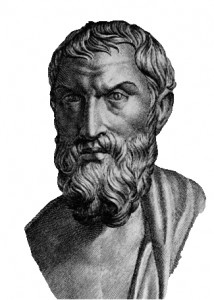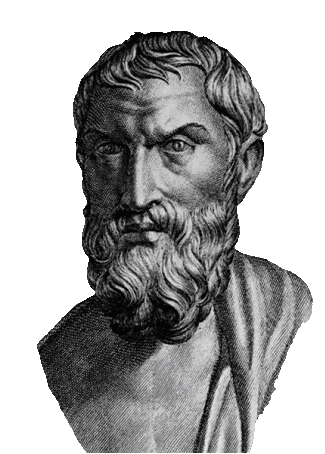Peace and Safety for your Twentieth of June – May you have many smooth and agreeable motions today!
 Peace and Safety to the Epicureans of today, no matter where you might be!
Peace and Safety to the Epicureans of today, no matter where you might be!
One of the great benefits I have found from Facebook is talking with friends about fine points of Epicurean doctrine. Yesterday I was discussing a topic I come back to frequently, that of the apparent disagreement among modern scholars as to the meaning of Epicurus’ doctrine of Anticipations. Bailey, writing earlier in the 20th century, stated in Greek Atomists and Epicurus that most modern scholars interpret anticipations as referring to a process in the mind of assembling particular perceptions into a general concept, and that this general concept becomes the anticipation which Epicurus was referring to as part of the canon of truth. DeWitt, writing after Bailey, goes to great lengths in Epicurus and His Philosophy to dispute Bailey’s viewpoint. In DeWitt’s view, Anticipations precede ANY experience with a particular perception, such that before a baby opens its eyes for the first time, it possesses rudimentary anticipations suited to development over a lifetime for grasping of relationships in fields of abstract ideas such as “justice.” The implications of the dispute are in my view profound, and extend to whether Epicurus is properly classified as an “empiricist” (as Bailey would have it) or an “intuitionist” (as DeWitt would have it). DeWitt sees this issue as key to what he calls Epicurus’ “dethronement of reason” from the canon of truth, and it is hardly necessary to do more than type those words to recognize the implications if DeWitt is correct.
I have no way to resolve that dispute, but readers of this blog know that I personally favor DeWitt’s interpretation, while trying to be fair to Bailey’s position as well. In the course of yesterday’s discussion, however, I was reminded of an interesting discussion in Cicero that might bear on this issue, and serves as the theme for today’s post.
Cicero (who is also the source for information on Anticipations that favors the Dewitt intepretation) recording the following in Tusculan Disputations as a statement represented to be that of Epicurus. Remember always that Cicero himself was a Stoic/NewAcademic, and so he can be expected to state any Epicurean proposition in terms that are intentionally unflattering to Epicurus’s real meaning. Nevertheless, as an attorney by training he was bound within some limits of accuracy, so that if misstated the proposition too unfaithfully his argument against it would not be credible, so what he records is often very valuable:
Yonge Translation: “Nor can I form any notion of the chief good, abstracted from those pleasures which are perceived by taste, or from what depends on hearing music, or abstracted from ideas raised by external objects visible to the eye, or by agreeable motions, or from those other pleasures which are perceived by the whole man by means of any of his senses; nor can it possibly be said that the pleasures of the mind are excited only by what is good, for I have perceived men’s minds to be pleased with the hopes of enjoying those things which I mentioned above, and with the idea that it should enjoy them without any interruption from pain.”
I have frequently seen this same phrase “agreeable motions” translated as “smooth motions.” “Cicero quotes [Epicurus] as stating that the good includes “the pleasures we get from sex, from listening to songs, from looking at [beautiful] shapes, from smooth motions, or any other pleasures which affect any of man’s senses.” (Tusculan Disputations, 3.41)”
Also in Tusculan Disputations, in another section critical of Epicurus, Cicero writes:
“Is it allowable even for Epicurus (who only puts on the appearance of being a philosopher, and who himself assumed that name for himself) to say (though, as matters stand, I commend him for his saying) that a wise man might at all times cry out, though he be burned, tortured, cut to pieces, “How little I regard it!” Shall this be said by one who defines all evil as pain, and measures every good by pleasure; who could ridicule whatever we call either honorable or base, and could declare of us that we were employed about words, and uttering mere empty sounds; and that nothing is to be regarded by us but as it is perceived to be smooth or rough by the body?“Tusculan Disputations
DeWitt’s interpretation of Anticipations, as I understand it, amounts to Anticipations being a faculty for perceiving “abstract relationships” of which the examples in the texts are “justice,” “divinity,” and “time.”
Is it possible that the unifying factor among these items, and the core metric that Anticipations are reporting to the mind, might be understood as a function of whether MOTIONS (presumably, motions of multiple objects being perceived in a relationship) are effectively “smooth” and “agreeable” or “rough” and “disagreeable?’
In the past I have tended to stumble over describing Anticipations as tools for perceiving “abstract relationships.” “Abstract” tends to imply some kind of Platonic ideal, which of course does not exist in the Epicurean world-view. “Relationships” does not seem to provide much help in assessing what it is that Anticipations are perceiving. Likewise, in my reading I have gathered that scholars thought “smooth motions” referred to nothing more significant than “dancing!”
All this leads me to muse: “I wonder if it would be in any way correct or helpful to think of Anticipations as the faculty of perceiving smooth motions vs. rough motions (which the pain/pleasure mechanism would then process as agreeable or disagreeable).
Regardless of whether there is any merit in that musing at all, I wish you many smooth and agreeable motions today!
________________
As Seneca recorded: Sic fac omnia tamquam spectet Epicurus! So do all things as though watching were Epicurus!
And as Philodemus wrote: “I will be faithful to Epicurus, according to whom it has been my choice to live.“

